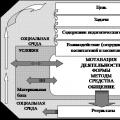List of adverbs. How to distinguish an adverb from an adjective? What is an adverb in Russian
Many English adverbs have the suffix -ly. To form an adverb, we add -ly to the adjective (slow - slowly, loud - loudly).
But in English there are also words that, although they end in -ly, are not adverbs. These are words such as friendly, likely, lonely, lovely, silly, ugly and some others. Despite the -ly at the end, they are all - adjectives and describe nouns:
He is a friendly person. - He is a friendly person.
The flowers are lovely. - The flowers are cute.
His question was silly. - His question was stupid.
My grandmother is a lively person. - My grandmother is an energetic person.
If you need to use these words as adverbs to describe actions, then adding another -ly to these adjectives is impossible.
You must use the in a ... way/ manner construction:
She smiled in a friendly way. - She smiled friendly.
The child was dressed in a lovely manner. - The child was dressed very cute.
He giggled in a silly way. - He giggled very stupidly.
They talked in a lively manner. - They had a lively conversation.
Words such as daily, weekly, monthly, yearly can be both adverbs and adjectives:
This newspaper comes out daily. - This newspaper is published daily. (Adverb)
My father is reading a daily newspaper - My father reads the daily newspaper. (Adjective)
We pay for rent monthly. - We pay rent monthly. (Adverb)
They are waiting for our monthly payment. - They are waiting for our monthly payment. (Adjective)
We hold our meetings weekly. - We hold our meetings weekly. (Adverb)
Our weekly meeting is put off. - Our weekly meeting has been postponed. (Adjective)
The conference takes place yearly.- The conference is held annually. (Adverb)
We invited Mr. Black for our yearly conference. - We invited Mr. Black to our annual conference. (Adjective)
But this is not the only difficulty in distinguishing between adverbs and adjectives. The fact is that there are a number of adverbs that have the same form as adjectives and are similar in meaning. But some adverbs and adjectives, although they have the same form, are completely different in meaning.
Adjectives and adverbs that have the same form and similar meaning:
|
Adjective |
Adverb |
|
|
Clean: The surface should be clean. - The surface must be clean. |
Completely: The kitchen must be clean washed. - The kitchen needs to be cleaned thoroughly. Completely, completely, completely, completely, completely: The words have gone clean out of my head. - The words completely flew out of my head. |
|
|
Mdead: The man was dead. - The man was dead. |
Completely, completely, completely: I am dead certain that he is guilty. - I am completely sure that he is guilty. Exactly, exactly: We arrived dead on time. - We arrived exactly on time. |
|
|
Fast, strong, durable: My car is very fast. - My car is very fast. This paint is fast. - This is a permanent paint. |
Fast, strong: He always drives too fast. - He always drives very fast. They were fast asleep. - They were fast asleep. |
|
|
Small, small, few: A little bird landed on the bench. - The little bird sat on the bench. She had little money. - She didn't have much money. |
Little, to a small extent: I wrote little of what she explained. - I wrote down a little of what she explained. |
|
|
Long, long: Thelecturewaslongandboring. - The lecture was long and boring. |
For a long time: I waited for you so long. - ISofor a long timeyouwaited. |
|
|
Abundant, in large volume (a lot): There is much light in this room. - There is a lot of light in this room. |
Very: I like swimming very much. - I really like to swim. |
|
|
Good, in good condition, healthy: She was ill last week but she is well now. - She was sick last week, but now she is healthy. |
Fine: He can sing very well. - He sings very well. |
How to distinguish an adverb from an adjective? An adjective always refers to a noun and describes its attribute. Most often, adjectives come before nouns in a sentence (a fast car), or are connected by a linking verb to be:
I want to buy a fast car. - I want to buy a fast car.
My car is very fast. - My car is very fast.
Adverbs describe a verb (action) and most often appear after the verb in a sentence:
He drives very fast. - He drives very fast.
If you need help improving your English, become a student at our school. Sign up for and start learning English via Skype on Enginform.
Stay tuned for updates and subscribe to our regular newsletter, join us on
This is the second part of the lesson on the difference between adjectives and participles. Wait, you haven't watched the first one yet?! Then I'll wait, a link to the previous lesson will appear here, you can pause me for now..
Have you looked? Okay, now let's continue.
How else can we recognize that this is an adverb?
While adjectives can have an incredible variety of suffixes: ous (glamorous), ful (careful), y (heavy) and many, many others; then most adverbs are formed from the adjectives themselves using the suffix LY: glamorous - glamorously, careful - carefully (note that l is doubled for a reason, but because here one suffix (ful) ends in L, and the other (ly) ends in L begins, heavy – heavily (usually when adding a suffix, y is replaced by i)
Do not forget also that good is an exception, and the adverb “good” will be “well”
But here, unfortunately, not everything is so simple. Some words that end in ly are adjectives, for example:
Friendly, lovely, lonely, silly.
What to do? Check your dictionary - it won't let you down.
We also need to remember that with the verbs be be /look look/feel feel/sound sound/taste be tasted when they are used in their direct meaning, we use an adjective and its place after the verb - be/look/feel/sound/taste+adjective.
She looked beautiful - She looked beautiful.
In Russian we use an adverb in such cases! Be careful, the rules of the English language require an adjective.
I am good - I feel good / I’m fine.
That sounds great! – That sounds great!
That's not all. There are three exceptions where many, many people make mistakes:
Late – hard – fast
These three words are both adverbs and adjectives. They don't change shape. That is, we can understand what we are dealing with by their position in the sentence:
She came late - She came late. After the verb there is an adverb.
Excuse my late arrival. – Sorry for my late arrival. – before the noun late – adjective.
He is a fast (adj) driver –
He drives fast (adv). he drives fast
My mom is a hard (adj) worker
My mom works hard (adv). my mom works hard
You can add the suffix LY to the words late and hard and get adverbs, but their meaning will then be different:
lately - recently
I have been getting tired a lot lately - I’ve been very tired lately.
That's all for today. Let's remember once again what we went through today.
1. Adjectives and participles have their own suffixes, by which you can guess which part of speech is in front of you. But don't rely on suffixes alone! They can also fail, as with the words friendly, lovely, lonely and silly, which are all adjectives.
2. After the verbs be/look/feel/sound/taste, when they are used in their main meaning, we use an adjective.
3. Late-hard-fast are both adjectives and adverbs, depending on the place in the sentence, the adverbs lately and hardly have other meanings.
How does an adverb differ from a short adjective? and got the best answer
Answer from Olga Savenkova[guru]
Very briefly, a short adjective answers the question: “what?” and denotes a feature of an object (For example, beautiful, smart, sweet; “what?” beautiful, smart, sweet; “what?” beautiful; “what?” beautiful, smart, nice)
And an adverb answers the question “how?” and most often denotes a sign of action (For example, singing (how?) well), but can also refer to an adjective ((how?) dazzling white), gerund (raising (how?) up ), sometimes to a noun (step (where? which?) back)
To distinguish a short adjective from an adverb, you need to look at the word to which the adverb refers. adj. or adverb, and ask a question from it to the doubtful one. The adverb will not answer the questions “what? adverb, it cannot be converted into a full adjective).
Reply from Yergey Antonov[active]
the adverb does not change...
Reply from [Tonechka][guru]
the adverb does not answer the questions what is what
adverb answers the question how, denotes a sign of action
Reply from 2 answers[guru]
Hello! Here is a selection of topics with answers to your question: how does an adverb differ from a short adjective?
Often, when talking with friends or acquaintances, we want to more clearly express some details, characterize objects, or convey a state. Such parts of speech as adjectives and adverbs help us to successfully achieve this goal. English. Today we will get acquainted with their features and capabilities, and also learn how to prevent one of the most common errors from occurring. All grammatical nuances are described in more detail in the material below. Let's get acquainted with the theory, and then consolidate our knowledge by completing thematic exercises.
Characterizing nouns
In order to designate the qualities, signs, properties of objects and persons, it is necessary to use adjectives ( theAdjectives). They play the role of a definition in a sentence and always appear in conjunction with nouns. According to the construction of the sentence, these parts of speech can be located either immediately before the word being described, or after the predicate.
- My little sister is creative – Myyoungersistercreative.
- They are serious people –TheyseriousPeople.
Examples show that using an adjective, we make a statement answering the question “ Which?».
To facilitate the practical exercise, it will be useful to know that adjectives are formed in a suffixal and prefixal way, that is, by adding suffixes or prefixes. The most common of them are: — al, -ful, -less, -ent, -able, -ed, -ing, -y, -ive, -ous; un-, dis-, in-, ir-, anti-, il— . Let us add that this part of speech does not change either by gender or by number, but has several forms of comparison. They are described in detail in the adjacent material. And now we move on to the study of adverbs.
Characterizing verbs
If, however, we talk about how an action is performed, or when and where events occurred, then we should use the category of adverbs ( the Adverb). In most situations, they describe the regularity, manner and course of processes, and refer to predicates, expressed verbs or bundles of auxiliary verbs with participles.
- Usually I play basketball on Wednesdays and Saturdays –UsuallyII'm playingVbasketballByWednesdaysAndSaturdays
- I often see the bird in the garden –IoftenI seethisbirdVmygarden.
- She is cooking breakfast now – SheNowcooksbreakfast.
- I have never beenonadesertisland– I have never been on a desert island.
Unlike the previous part of speech, adverbs can never describe nouns.
- My dog is old , butheruns quickly - My dog is old (noun description), but he runs fast (action description).
The example clearly shows what dictates the use of adjectives and adverbs in different situations. However, there are cases when adjectives and adverbs interact with each other in English. This happens if the adverb expresses the degree of quality/property/attribute of the specified adjective.
- Thoseexerciseswere too simple– Those exercises were too simple.
- My mother is a very beautiful woman –MymotherVerybeautifulwoman.
Adverbs can occupy very different positions in a sentence, which is easy to see by looking again at the examples given.
How does an adverb differ from a short adjective? and got the best answer
Answer from Olga Savenkova[guru]
Very briefly, a short adjective answers the question: “what?” and denotes a feature of an object (For example, beautiful, smart, sweet; “what?” beautiful, smart, sweet; “what?” beautiful; “what?” beautiful, smart, nice)
And an adverb answers the question “how?” and most often denotes a sign of action (For example, singing (how?) well), but can also refer to an adjective ((how?) dazzling white), gerund (raising (how?) up ), sometimes to a noun (step (where? which?) back)
To distinguish a short adjective from an adverb, you need to look at the word to which the adverb refers. adj. or adverb, and ask a question from it to the doubtful one. The adverb will not answer the questions “what? adverb, it cannot be converted into a full adjective).
Reply from Yergey Antonov[active]
the adverb does not change...
Reply from [Tonechka][guru]
the adverb does not answer the questions what is what
adverb answers the question how, denotes a sign of action
Reply from 2 answers[guru]
Hello! Here is a selection of topics with answers to your question: how does an adverb differ from a short adjective?
 Secret expedition of the OGPU to the mysterious country of Shambhala
Secret expedition of the OGPU to the mysterious country of Shambhala Scientific electronic library The pedagogical process represents
Scientific electronic library The pedagogical process represents Presentation on the topic "A.A. Blok". Presentation on the topic "Alexander Alexandrovich Blok" Family and relatives
Presentation on the topic "A.A. Blok". Presentation on the topic "Alexander Alexandrovich Blok" Family and relatives